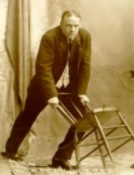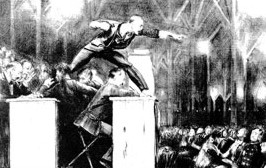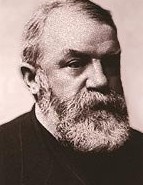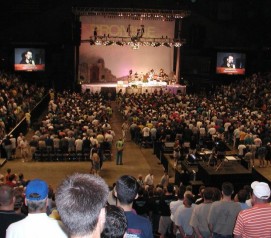Christian Disneyland
 |
Billy Sunday started the trend toward Christian Disneyland. In 39 years, he evolved from a typical 19th century evangelist to the symbol of excess epitomized in C. S. Lewis's Elmer Gantry. In 1886, he was a successful professional baseball player when God saved him at the Pacific Garden Mission in Chicago. |
|
SUNDAY
|
The altar call asked him to come forward to confess his sins, seek Christ's forgiveness, and live in obedience to Christ's teachings. His born again salvation experience was definite and complete. He soon started preaching at the YMCA and other places, where he would asked penitents to come to the after meeting for prayer and individual counsel.
Eventually he was hired by the popular evangelist, J. Wilber Chapman as an advance man and sometimes preacher. Chapman, like his mentor, D. L. Moody, had very high standards. He taught Sunday the ropes, always emphasizing the effective use of the after meeting, counseling and personal prayer. Sunday started his own organization with the same high standards, but in the economic boom years of the early 20th century, something went wrong. By 1918, the altar call became nothing more than a way to get people to come forward.
Homer Rodeheaver, his Music Director of 17 years , after pointing out the dishonesty, quit. "When he makes his proposition for everyone to come it loses its effect because people cannot see any definite, specific thing for which they should come." 1 By the end of his career, he coaxed various groups to come forward for increasingly absurd reasons, little of which had to do with conviction of the Holy Spirit. He boasted that he "never gave an invitation where no one had come."
"Come on, you Masons," or "come on, sailors" or "come on there, Wanamaker Store, you're a fine looking bunch." At one time Sunday had worked on the railroad and was particularly eager to appeal to railroad men: if railroad workers were present he sometimes shouted "come on, Erie" or "Boston and Maine" and wave a green lantern. At other times when other groups were present he would appeal to them by name, "come on, Boston, come on people. Come on Roxbury. Come on Somerville. Come on, Newton.. .Don't, I beg you in the name of the Lord, refuse." When young people's church groups were present, he invited them with a challenge: "Come on, Epworth Leaguers, Christian Endeavors, everybody. What'll you do? What'll you do?" Sometimes he stood on top of the pulpit waving two American flags or a large church flag in order to stimulate the trail-hitting. On "Scotch Night" in Boston he called to the large Scotch delegation which had come with bagpipes and kilts, "Come on Scotchmen. Show some of the grit of Wallace and Bruce." And he waved a Scottish flag from his perch on the pulpit. To a Swedish delegation one night he shouted, "Come on Swedes. The Swedes have never been cowards yet. So come on."2
 |
The fears of 19th century pastors were fully realized with Sunday. He never repented of his theatrics. Some pastors, seeing the abuse, abandoned Sunday's meetings, but most went along for the ride. Sunday left a trail of damage unrivaled in the history of evangelism. |
|
SUNDAY ALTAR
CALL
|
Not that the temptation for abuse wasn't always present for every minister of the Gospel.
Some Pastors, like Reverend Orson Parker, seeing the abuse, changed his own method. "For about fifteen years I made use of the 'anxious seat', till I saw that the people began to trust in it; and that, although they would go to the 'anxious seat', they would not go to Christ. It had been injudiciously used as the 'mourner's bench' and the 'anxious seat', until people generally became prejudiced against it. So that few would come forward when called unless somebody went and urged them, and almost pulled them forward." 3 It is important to note that this minister continued using the after meeting where he could personal counsel and pray with individuals.
Decades before, D.L. Moody attracted large, excited crowds. But instead of encouraging emotional outbursts, he discouraged them. One time in Glasgow, Scotland, the emotional pitch was so high, that as the Christian reported, the crowd "blocked the streets for hours and the excitement penetrated the meeting to such an extent that an inquiry meeting was not even attempted....other revival movements seemed to have flourished on excitement, but this is at once killed by it; and instead of taking advantage of heated occasions, Mr. Moody waits for the night of quiet power and the whisper of the still small voice." 4.
 |
Charles Goss wrote, "From the first moment to the last, the fact that he meant business, and not fireworks, oratory or theatricals was apparent." 5 For Moody, the sermon was the prelude to the after meeting, where he threw himself into the fray of seekers. He counseling, prayed for, and instructed illuminated and confused alike, but never led anyone in a formula "sinner's prayer." |
|
MOODY
|
In the beginning of his career, Billy Sunday used the same methods with care and integrity. But by 1914, he was giving altar calls like this: "How many of you will settle the great question without the delay of another minute, by coming forward to take me by the hand, and by doing so confess and accept Jesus Christ as your personal Savior? Will you come?" 6
His invitation was different from modern altar calls only by the omission of the formula "salvation prayer." At least with Billy Sunday, the "trail hitters" were not led in a quasi marriage vow, to a Bridegroom most had little knowledge of, or affection for.
Sunday's decision cards were similar to many other evangelists. It had at the top, "I now accept Jesus Christ as my Personal Savior." Underneath were places to fill in name, address, church preference, pastor, and a box to check if it was a "reconsecration." (what modern evangelists call "rededications") A tract was given to every person who filled out a decision card that said, "You have by this act of coming forward publicly acknowledged your faith in Jesus Christ as your personal savior." Whether this was as confusing as the modern practice of leading people in a formula "salvation prayer" is for you to decide.
The dishonesty and compromise
was evident in other areas of Sunday's ministry. After the Chicago campaign
of 1918, the Sunday
organization reported
667 decision cards were sent to Moody's church. 373 were listed as conversions,
and 294 were listed as "reconsecrations". Only 508 cards were
received by Moody's church. After a four month follow-up, here's how the
supposed conversions and "reconsecrations" turned out: 7 said
they only went forward to shake hands with Billy Sunday. 33 said they
were saved before the campaign. 14 said they accepted Christ at the campaign.
6 were led to Christ at the follow-up. 3 refused to accept Christ at follow-up.
40 were unable to find at home. 143 had not given a correct address. (How
well evangelists know these tactics) 76 were only prayed for at follow-up.
15 had moved and left no address. 6 went to war. 126 were already members
of Moody's church. 39 were not yet reached.
 |
Most Modern evangelists don't attempt to determine the condition of the people that go forward for altar calls. Many generations have passed since Moody's church thought it was important enough to find out. Evangelists know that the majority of seekers are merely illuminated, not saved. But the conspiracy of silence continues. |
|
MODERN ALTAR
CALL
|
Go to The Chapter, What Would You Do?
1 Pg 136, Billy Sunday, Lyle
W. Dorsett, 1991
2 Pg 102, Billy Sunday Was His Real Name,
McLoughlin, 1955
3
Pg 45, The Mourner's Bench, Henry B. McLendon, 1902
4 Pg 201, Moody, John Pollock, 1997
5 Pg 251, Ibid
6 Pg 146, The Real Billy Sunday, Elijah P.
Brown, 1914